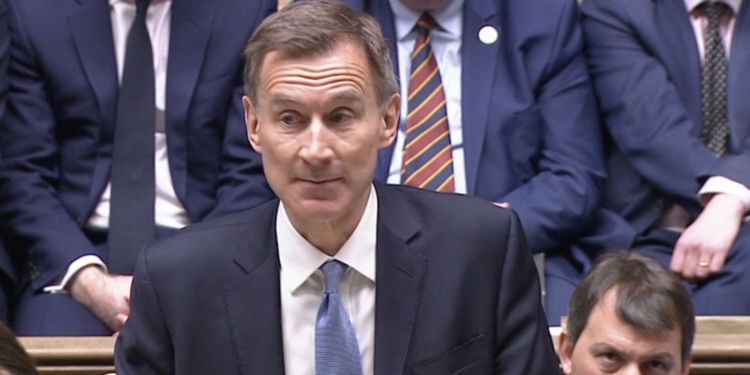Tax-free cash will not be given assets above the current £1,073,100 lifetime allowance, for the first time breaking the principal that 25 per cent of all pension assets can be paid out tax free.
Chancellor Jeremy Hunt’s abolition of the lifetime allowance, increase in the annual allowance from £40,000 to £60,000 and increase in the Money Purchase Annual Allowance from £4,000 to £10,000, have been broadly welcomed by pension professionals. But advisers have questioned whether the limit of tax-free cash to the original LTA, marks the beginning of a real-term erosion of the 25 per cent lump sum. Tax-free cash will be limited to £268,275 under the plans.
The Ink Group managing director Billy Johnson says: “My concern here is that the fundamental principle that 25 per cent of pension is paid tax-free has been broken. Once the genie is out of the bottle it is very hard to get it back in. Will we see the government freeze the tax-free cash element for ever, which means it gets smaller in real terms as a result of fiscal drag?”
Steven Cameron, pensions director, Aegon says: “The Chancellor pulled a massive rabbit from his Budget hat by scrapping the Lifetime Allowance, rather than a rumoured increase to £1.8m. This comes at the same time as the Annual Allowance is being increased by 50% from £40,000 to £60,000, and the Money Purchase Annual Allowance being raised from £4,000 to £10,000.
“It has always been excessive to have both a lifetime and annual allowance, effectively limiting not just how much can be paid in each year but how much you can hold on a tax favoured basis in total. With most people now in a defined contribution rather than a defined benefit scheme, it makes sense to focus on setting a limit on contributions rather than ultimate benefits. In a defined benefit scheme, having a lifetime allowance meant those who saved diligently could end up facing a tax penalty if they achieved good investment returns.
“Removing the lifetime allowance will also cut out a swathe of complex pensions tax rules. It will allow individuals who have stopped contributing for fear of exceeding it to consider restarting contributions. It may also, subject to any detailed provisions, allow people who have already started taking benefits to top these up.
“Not surprisingly however, the amount which can be taken tax free will be restricted to 25 per cent of the current Lifetime Allowance of £1,073,100 or £268,275. Allowing 25 per cent of an unlimited pension pot tax free would have been excessively generous.”
Jon Greer, head of retirement policy, Quilter says: “Abolishing the lifetime allowance represents the biggest U-turn on pension tax policy in a decade and for defined contribution savers this will come as a much-welcomed change. The lifetime allowance was applied to the value of the fund accumulated, including investment returns as well as pension contributions, and people can inadvertently exceed the threshold even if they stop actively contributing while still some way below it.
Many who had ceased contributing to pensions for fear of incurring lifetime allowance tax charges may well be considering restarting contributions and together with a 50 per cent increase in the annual allowance can make material tax savings. This is a seismic shift in policy to the benefit of higher earners. One wonders how long such generosity will last for as we’d expect a significant uptick in the amount being funded into pensions by those with higher earnings. This is not a cheap policy decision with the government forecasting that it will cost them around £2.7bn to scrap the lifetime allowance over the next five years. This therefore represents a golden opportunity for high earners to plough money into their pensions.
“However, hidden in the documents is a sting that people will now only be able to take 25 per cent tax free cash from their pension subject to a maximum of £268,275 so even if someone has a pension pot far bigger than the previous LTA this will be the most they can take out. However, those who have existing rights to higher TFC amounts will retain them.
“The changes to the AA while once again aimed at high earners have a much more practical application and help to fix a significant problem with the NHS Penson Scheme and other public sector defined benefit schemes. Many doctors have been forced to pay huge tax bills as a result of how the scheme interacts with the AA which definitely does disincentivise them to take on extra hours with some opting to retire earlier.
“Many people leave the workplace because they feel they have accrued enough money already and while they could increase their retirement wealth, they have decided to start their retirement a little earlier and take that financial hit. Whether an unlimited lifetime allowance changes this behaviour is yet to be seen.
“The tapered annual allowance has had few supporters, but is retained subject to increasing the minimum amount tapered annual allowance to £10k (from £4k). The tapered annual allowance raises revenue from those with income including pension contributions that is above £260k (increasing from £240k currently). The problem with the taper still remains though; it is a complex way of restricting relief for the very highly paid and is inflexible for those in defined benefit schemes who typically have less control over the amount deemed to have been added to their pension each year. Therefore, it still provides a disincentive for them to work more and signals to them that normal pension provision is not designed for them.”





